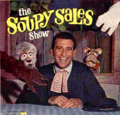 The Soupy Sales show was a unique kids’ show with lots of adult appeal that made us all feel like little hipsters. Soupy, a multi- talented performer, hosted several local, national, and syndicated children’s shows from the 1950’s through the 1970’s, with broadcasts originating from Detroit, Los Angeles, and New York. He reached the height of his popularity with the syndicated show produced in New York City beginning in 1964.
The Soupy Sales show was a unique kids’ show with lots of adult appeal that made us all feel like little hipsters. Soupy, a multi- talented performer, hosted several local, national, and syndicated children’s shows from the 1950’s through the 1970’s, with broadcasts originating from Detroit, Los Angeles, and New York. He reached the height of his popularity with the syndicated show produced in New York City beginning in 1964.
Soupy’s show was a kind of ironic twist on the standard conventions of earlier kids’ TV shows, combining vaudeville antics (primarily in the form of frequent pies in the face, which became Soupy’s trademark), puppets, Laugh-In-style comedy sketches, musical numbers that made use of Soupy’s extensive jazz record collection, and guest appearances by major stars of the day, like Frank Sinatra, Sammy Davis, Jr., and singing groups like the Shangri-Las and the Supremes. Much of the show was ad-libbed, which gave it a loose and slightly dangerous feeling – you knew that anything could happen on the show, and it often did.
The puppets on the show were pretty strange. White Fang, billed as “The Biggest and Meanest Dog in the USA,” appeared only as a giant white shaggy paw at the edge of the TV screen. Fang spoke only in grunts and growls, which Soupy hilariously translated for the viewers. Fang threw pies at Soupy when Soupy’s jokes bombed. There was also Black Tooth, “The Biggest and Sweetest Dog in the USA,” who appeared as a giant furry black paw and spoke with similarly unintelligible but somewhat more feminine doggy sounds, and would pull Soupy off-camera to give him loud wet kisses.
Pookie the Lion was a little hand-puppet who appeared on a puppet stage behind Soupy. Despite his cuddly appearance, Pookie was a hipster who engaged in rapid-fire repartee with Soupy. He often greeted Soupy with, “Hey bubby, want a kiss?” Pookie would mouth the words to jazz, soul, or pop recordings while he and Soupy bopped around to the music.
Soupy’s show also featured a number of live characters, including Peaches, Soupy’s girlfriend, played by Soupy in drag; Philo Kvetch, a private detective played by Soupy; The Mask, Philo’s evil nemesis, also played by Soupy and later revealed to be deposed USSR leader Nikita Khrushchev; and Onions Oregano, The Mask’s henchman, played by actor Frank Nastasi, who was always eating onions. Every time he breathed in Philo’s direction, Philo would choke and make faces, spray air freshener around, and exclaim, “Get those onions out of here!”
There are a couple of notorious incidents that took place on the show that illustrate how unpredictable and edgy the live show could be. One occurred on New Year’s Day in 1965, when Soupy was apparently annoyed about having to do the show on a holiday. At the end of the broadcast, Soupy urged his young viewers to tiptoe into their still-sleeping parents’ bedrooms and remove the “funny green pieces of paper with pictures of US presidents” from their parents’ wallets. Soupy told the kids to put the bills in an envelope and mail them to him, promising to send them back a postcard from Puerto Rico. Then he got hit in the face by a pie.
When Soupy began receiving envelopes with cash in the mail, he was forced to explain on his show that he had only been kidding and would donate the unreturnable money to charity. But complaints by parents poured into WNEW, the New York City station that produced Soupy’s show, and the station’s management suspended Soupy’s show for two weeks to try to appease the public. Of course, this only generated a backlash by Soupy’s outraged fans, and even led to children picketing the station’s offices. When Soupy returned to the air, he was more popular than ever.
Another time, Soupy’s studio crew played a joke on Soupy on his birthday. The show supposedly took place in Soupy’s living room, and a continuing skit involved someone knocking on Soupy’s door and Soupy opening the door to find a guest celebrity or an off-screen character that the home audience couldn’t see, that Soupy would comically interact with. On Soupy’s birthday, Soupy opened the door to encounter an off-screen stripper who proceeded to perform her act to the tune of “The Stripper,” a popular musical number at the time. Though the home viewers only saw the beach ball that the “stripper” used strategically as part of her act, Soupy saw the entire number and thought that the home audience could see her, too. Soupy and the crew cracked up, but Soupy seemed a little worried about audience complaints. Sure enough, though nothing explicit was broadcast, controversy ensued, which only enhanced the delight that Soupy’s outlaw behavior generated among his young fans.
You can see Soupy for yourself in several DVD collections, including Soupy Sales Collection (Volume 1), Soupy Sales Collection (Volume 2), Soupy Sales Collection: The Whole Gang is Here!, and Soupy Sales: In Living Black and White. You can read more about Soupy in his autobiography Soupy Sez!: My Zany Life and Times (paperback) and in From Soupy to Nuts: A History of Detroit Television (paperback). Soupy fans might also want to buy Stop Me if You Heard It! Soupy Sales Favorite Jokes (paperback).

Recent Comments